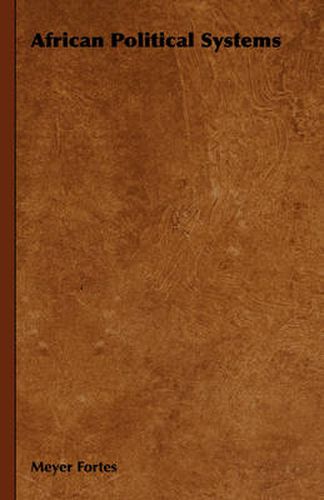Readings Newsletter
Become a Readings Member to make your shopping experience even easier.
Sign in or sign up for free!
You’re not far away from qualifying for FREE standard shipping within Australia
You’ve qualified for FREE standard shipping within Australia
The cart is loading…






This title is printed to order. This book may have been self-published. If so, we cannot guarantee the quality of the content. In the main most books will have gone through the editing process however some may not. We therefore suggest that you be aware of this before ordering this book. If in doubt check either the author or publisher’s details as we are unable to accept any returns unless they are faulty. Please contact us if you have any questions.
AFRICAN POLITICAL SYSTEMS by Fortes, Meyer CONTENTS: EDITORS’ NOTE. PREFACE. Professor A. R. Radcliffe-Brown, M.A. (Cantab.), Emeritus Professor of Social Anthropology in the University of Oxford INTRODUCTION. Dr. M. Fortes and Professor E. E. Evans-Pntchard Aims of this Book. A Representative Sample of African. Societies. Political Philosophy and Comparative Politics. The Two Types of Political System Studied. Kinship in Political Organization. The Influence of Demography. The Influence of Mode of Livelihood. Composite Political Systems and the Conquest Theory. The Territorial Aspect. The Balance of Forces in the Political System, The Incidence and Function of Organised Force. Differences in Response to European Rule. The Mystical Values Associated with Political Office. The Problem of the Limits of the Political Group. THE KINGDOM OF THE ZULU OF SOUTH AFRICA. Max Gluckman. B.A. (How.) (Witwatersrand), D.Phil. (Oxon). Professor of Social Anthropology in the University of Manchester Historical Introduction. The Zulu King and the State. Status and Political Power. The Tribes within the Nation, Sanctions on Authority and the Stability of the State. The People and their Leaders. The Period of European Rule. Conclusion. THE POLITICAL ORGANIZATION OF THE NGWATO OF BECHUANALAND PROTECTORATE. /. Schapera, M.A, (Cape town), Ph.D., D.Sc.(London), F.R.S.S.Af. Professor of Social Anthropology in the University of Cape toton Ethnic Composition and Territorial Constitution. The Administrative System. Powers and Authority of the Chief. Rights and Responsibilities of Chieftainship. THE POLITICAL SYSTEM OF THE BEMBA TRIBE NORTHEASTERN RHODESIA. Audrey I. Richards, M.A(Cantab\ Ph.D.(London). Reader in Social Anthropology at the London School of Economics and Political Science, University of London 83Bantu Political Organization Some General Features The Bemba Tribe: Tribal Composition Social Grouping Kinship Local Grouping Rank Other Principles of Social Grouping Economic Background White Administration. Bases of Authority: The Dogma of Descent Legal Rules of Descent and Succession. Functions and Prerogatives of Authority: The Headman the Chief. The Machinery of Government: Administrative Military Judicial Advisory, The Integration of the Tribe. Post-European Changes: New Authorities introduced Effects of the 1929 Ordinances. THE KINGDOM OF ANKOLE IN UGANDA K. Oberg, A.M., Ph.D.(Chicago)t Escola Livre de Sociologia e Politica, SSo Paulo, Brazil Traditional and Historical Background. Political Status, the King and the Royal Kraal. Tribute. The Cult of Bagyendanwa. Succession. Conclusion.
$9.00 standard shipping within Australia
FREE standard shipping within Australia for orders over $100.00
Express & International shipping calculated at checkout
This title is printed to order. This book may have been self-published. If so, we cannot guarantee the quality of the content. In the main most books will have gone through the editing process however some may not. We therefore suggest that you be aware of this before ordering this book. If in doubt check either the author or publisher’s details as we are unable to accept any returns unless they are faulty. Please contact us if you have any questions.
AFRICAN POLITICAL SYSTEMS by Fortes, Meyer CONTENTS: EDITORS’ NOTE. PREFACE. Professor A. R. Radcliffe-Brown, M.A. (Cantab.), Emeritus Professor of Social Anthropology in the University of Oxford INTRODUCTION. Dr. M. Fortes and Professor E. E. Evans-Pntchard Aims of this Book. A Representative Sample of African. Societies. Political Philosophy and Comparative Politics. The Two Types of Political System Studied. Kinship in Political Organization. The Influence of Demography. The Influence of Mode of Livelihood. Composite Political Systems and the Conquest Theory. The Territorial Aspect. The Balance of Forces in the Political System, The Incidence and Function of Organised Force. Differences in Response to European Rule. The Mystical Values Associated with Political Office. The Problem of the Limits of the Political Group. THE KINGDOM OF THE ZULU OF SOUTH AFRICA. Max Gluckman. B.A. (How.) (Witwatersrand), D.Phil. (Oxon). Professor of Social Anthropology in the University of Manchester Historical Introduction. The Zulu King and the State. Status and Political Power. The Tribes within the Nation, Sanctions on Authority and the Stability of the State. The People and their Leaders. The Period of European Rule. Conclusion. THE POLITICAL ORGANIZATION OF THE NGWATO OF BECHUANALAND PROTECTORATE. /. Schapera, M.A, (Cape town), Ph.D., D.Sc.(London), F.R.S.S.Af. Professor of Social Anthropology in the University of Cape toton Ethnic Composition and Territorial Constitution. The Administrative System. Powers and Authority of the Chief. Rights and Responsibilities of Chieftainship. THE POLITICAL SYSTEM OF THE BEMBA TRIBE NORTHEASTERN RHODESIA. Audrey I. Richards, M.A(Cantab\ Ph.D.(London). Reader in Social Anthropology at the London School of Economics and Political Science, University of London 83Bantu Political Organization Some General Features The Bemba Tribe: Tribal Composition Social Grouping Kinship Local Grouping Rank Other Principles of Social Grouping Economic Background White Administration. Bases of Authority: The Dogma of Descent Legal Rules of Descent and Succession. Functions and Prerogatives of Authority: The Headman the Chief. The Machinery of Government: Administrative Military Judicial Advisory, The Integration of the Tribe. Post-European Changes: New Authorities introduced Effects of the 1929 Ordinances. THE KINGDOM OF ANKOLE IN UGANDA K. Oberg, A.M., Ph.D.(Chicago)t Escola Livre de Sociologia e Politica, SSo Paulo, Brazil Traditional and Historical Background. Political Status, the King and the Royal Kraal. Tribute. The Cult of Bagyendanwa. Succession. Conclusion.